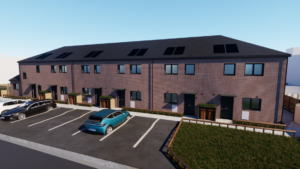Joseph Rowntree Foundation: what action needs to be taken to reduce homelessness in Scotland
 Deborah Hay, Scotland Policy Officer for The Joseph Rowntree Foundation writes for New Start about what action the Scottish government must take to reduce homelessness.
Deborah Hay, Scotland Policy Officer for The Joseph Rowntree Foundation writes for New Start about what action the Scottish government must take to reduce homelessness.
In Scotland, we have a firm commitment to end homelessness backed by legislative rights to settled housing. As well as moving people quickly into a permanent home, the clear focus is on prevention for those most at risk, working to integrate effective responses across all public services.
The Scottish Government’s Ending Homelessness Together Action Plan (November 2018) addresses 70 original recommendations, which, if implemented and resourced well, could achieve real progress in preventing and tackling homelessness.
However, despite this positive ambition and significant recent investment in affordable and social housing, the progress reported in previous years has stalled. The latest research by Heriot-Watt University for JRF and Crisis suggests that, in Scotland, the numbers of people rough sleeping and presenting as homeless have remained relatively stable. This is welcome, given the strong headwinds of UK welfare reform, low and insecure pay and rising living costs, including housing.
Yet almost 30,000 people were ‘legally homeless’ in 2018. While 700 people rough sleeping on an average night might be fewer than previous years, it is still 700 too many. With over 10,000 people in temporary accommodation, including a sharp rise for families, we can’t be complacent in Scotland and equate good policy ambition (which we do have) with outcomes achieved (which we haven’t).
With Universal Credit now rolled out in both Edinburgh and Glasgow, and the benefit cap affecting a growing number of families, the pressures on people in poverty are likely to increase. Three in four councils who took part in the research said they expect homelessness to rise due to welfare changes. Many already report difficulty in accessing social housing for homeless clients, suggesting more capacity is needed. This makes the shift to early intervention even more pressing.
At JRF we want to see action taken at Scottish and UK levels:
Ending destitution by design
Our Destitution report last year found 1.5m people a year across the UK had experienced destitution. Those pulled under had commonly endured severe poverty for long periods, before finally being overwhelmed by harsh debt recovery and benefit deduction (often to public sector agencies and utility companies) as well as benefit delays, errors and sanctions.
Much of the misery inflicted here compounds existing vulnerabilities in our fellow citizens and could easily be avoided.
Accelerating improvements to temporary accommodation
The private rented sector now houses about 15 % of households (increasingly young people and families) and while recent reforms around security of tenure in Scotland are welcome, the value of Local Housing or Shared room Allowance has been eroded to such an extent that it is no longer sufficient to meet its original intention of meeting the costs of the bottom 30% of local market costs. This leaves an increasing number of households facing a ‘gap’ in income for their rent, that they need to find or be driven into poorer quality accommodation. Despite mitigation by the Scottish Government, support is wholly inadequate.
The report reveals positive changes, with greater social housing allocations to homeless people but also highlights that there has been a 25% increase in families with children in temporary accommodation, often for far too long.
At the Housing Festival in Glasgow, Campbell Robb, JRF’s CEO suggested that given the focus on prevention in Scottish public policy, ensuring that no children end up homeless or stuck in temporary accommodation would be a strong test of the policy in practice.
The Scottish Federation of Housing Associations, Shelter Scotland and the Chartered Institute of Housing recently announced they will be commissioning updated research to assess housing need, to inform Scottish Government planning post 2021.
Action we’ve called for
- We must remove the need for advance payments (which are really loans) within UC, by ensuring a first payment is made within two weeks.
- We must quickly address the way Universal Credit pays for housing costs, so that tenants are not confronted by apparent arrears and demand letters, and landlords are not carrying undue risk.
- Ensure front-line services have the skills to deliver bespoke support so people don’t fall through the cracks.
- Re-aligning LHA so that – at least – it fulfills its intention to cover the bottom 30% of local market rents
Homelessness stops people creating a safe, secure future for themselves and their family and hurts us all. Scotland’s example shows that there are approaches and policy solutions which can work – but it will require consistent action and resource to match up the reality with the ambition.
The report on the final recommendations of the Homelessness and Rough Sleeping Action Group – https://www.gov.scot/publications/homelessness-and-rough-sleeping-action-group-final-report/















